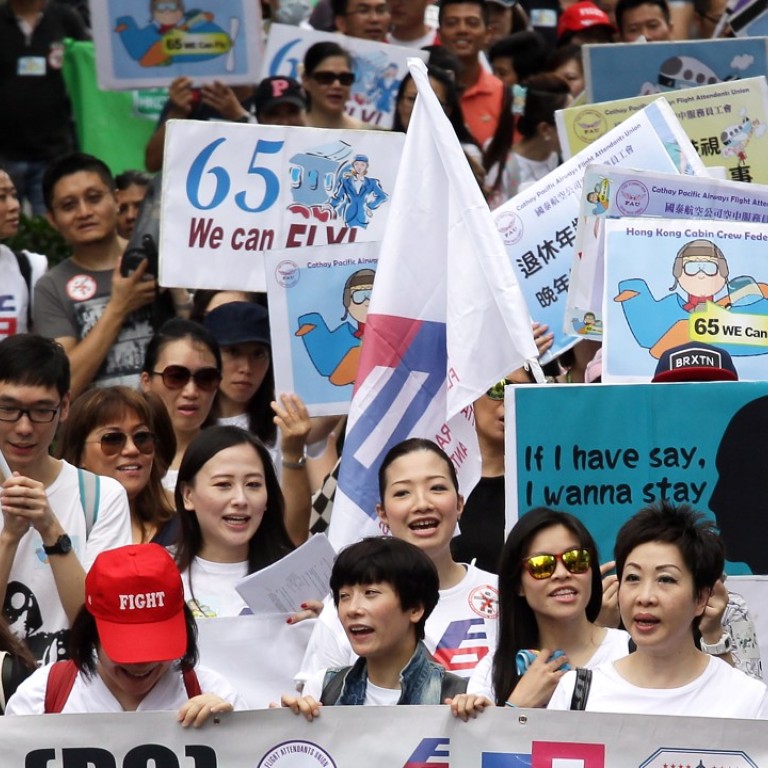
Letters to the Editor, September 2, 2017
No excuse for discrimination on age grounds
In Hong Kong, age discrimination in the workplace is a serious problem. Although the government has legislated against such discrimination, ageism is a fact of life in the city.
According to a survey by the Equal Opportunities Commission, more than one in three employees faced some form of age discrimination in the workplace, including lower pay and denial of advancement opportunities. About one in four workers said they could not get promotions due to their age.
This is a distressing trend. According to government projections, about one-third of the population in Hong Kong will be aged 65 or above in 2041.
As the population ages, if employers continue to discriminate against older workers, the city will face problems like manpower shortage and a shrinking labour force.
Some people have highlighted the problem of sexual discrimination in Hong Kong workplaces. I think age discrimination is even more pervasive.
Alice Ma, Hang Hau
Conditions in Hong Kong forcing exodus
Human resources company Randstad recently surveyed 13,200 people from 33 places, including about 400 from Hong Kong. The poll showed that 56 per cent of respondents in Hong Kong would be willing to leave the city for a job they desire.
I believe the poll reflects the current reality in Hong Kong. In recent years , the political environment has become unstable. Young citizens are concerned about Hong Kong’s future and have participated in activism, which has seen some radicals hurt and even sent to jail,
No parent wants their children to face troubles like this. Therefore, many would prefer to emigrate in search of a more stable environment overall.
Moreover, work conditions are much better in some other countries. Take our doctors or medical staff, left exhausted and stressed with their workload amid staff shortages. They wish to emigrate for a more comfortable working environment and more flexible hours.
High property prices are another factor fuelling the exodus, not only for workers but companies as well.
The problem of talent outflow must be tackled by the government, as this will affect the development of the city.
Zoe Chung Ka-man, Po Lam
Storm troopers deserve more than credit
Even though the majority got a day off when Typhoon Hato hit Hong Kong, a number of people still went to work. I believe offering double pay can be one of the ways to recognise the contribution of these employees.
However, other than double pay for typhoon days, we citizens can do more to “protect” the ones who need to work in dangerous situations. For example, we should never go hiking or engage in sea activities when typhoon or rainstorm signals are up. This is not just to protect ourselves from danger but to ensure that no one else, such as emergency services workers, gets hurt because of our negligence.
Just like your correspondent, I appreciate the efforts of the fast food outlets, supermarkets and convenience stores that stayed open so that citizens faced minimum inconvenience.
Moreover, while safe in our homes, we must not be indifferent to risks faced by others. You hear of people ordering food on typhoon days, but spare a thought for the delivery worker who must battle the elements. No one should underestimate the power of nature.
Scarlet Woo, Tai Wai
Give students space to voice their feelings
(“ ‘Emotional education’ lacking in Hong Kong schools”, August 28).
Many young students these days lack the skills to handle pressure, and some are even driven to suicide. Heavy workloads at school and the huge expectations of parents are probably the main reasons that push them into a corner.
Both teachers and parents have a responsibility to change this situation.
As mentioned in the article, it requires a certain sensitivity and training for teachers to read the symptoms of emotional problems. I think every teacher should attend training classes where they can learn to read the signs of emotional distress.
As for parents, they have to take a more relaxed approach and try not to put so much pressure on children. They should also communicate more with their children so that the youngsters feel comfortable about expressing their feelings.
Cecilia Cheng, Kwai Chung
Exams turning our children into robots
The exam-oriented framework is an emblem of our education system. Students are left stressed out and depressed, as they attend countless tutorial classes in the hope of getting the Holy Grail of 5** in the Diploma of Secondary Education.
Baptist Oi Kwan Social Service surveyed 15,560 students in Form One to Six at 37 schools across Hong Kong, and found that 53 per cent displayed symptoms of depression. This was 2 per cent higher than the previous year, showing that students are becoming more frustrated about their academic prospects.
Students become like robots as they learn by rote, which kills the enthusiasm for learning. Children do not ask questions and are not curious about different phenomena, trained as they are only to memorise answers.
The Education Bureau in Hong Kong must therefore rethink the city’s exam-oriented system, for the sake of the future of the younger generation.
Sara Wong Kit-yu, Tseung Kwan O
Virtual reality is changing today’s world
Technology in the present day is evolving very fast, and now we are in the age of virtual reality (VR) gaming, where people can experience this amazing realistic technology in the comfort of their homes. Not only that, games such as the newly launched Sea Quest Hero are important tools for medical research and treatment.
VR technology is also used in military training, where VR training courses or battlefield simulators help to hone the combat capability of soldiers at much lower costs. Then there are flight simulators for pilots to practise their emergency handling capacity. This is how VR is transforming our world.
Jacky Sit, Tiu Keng Leng

